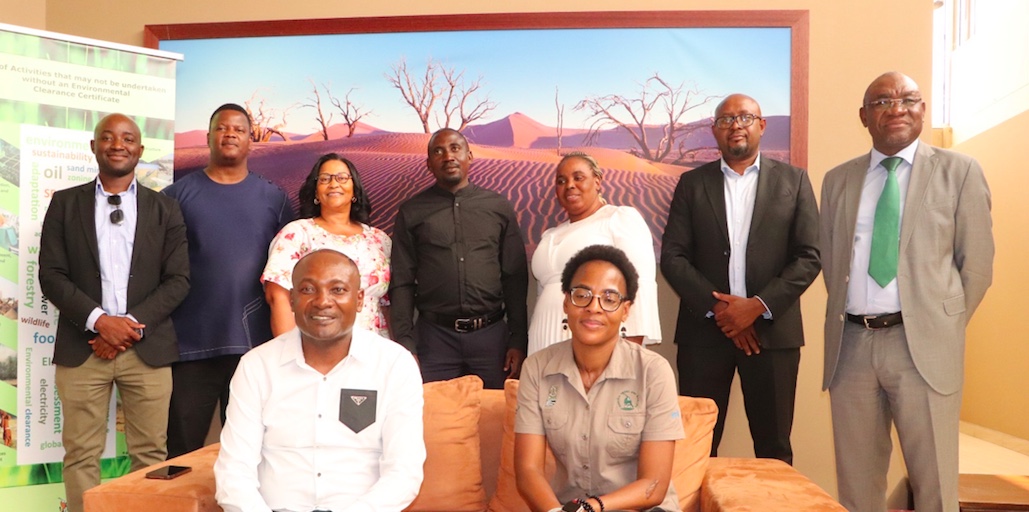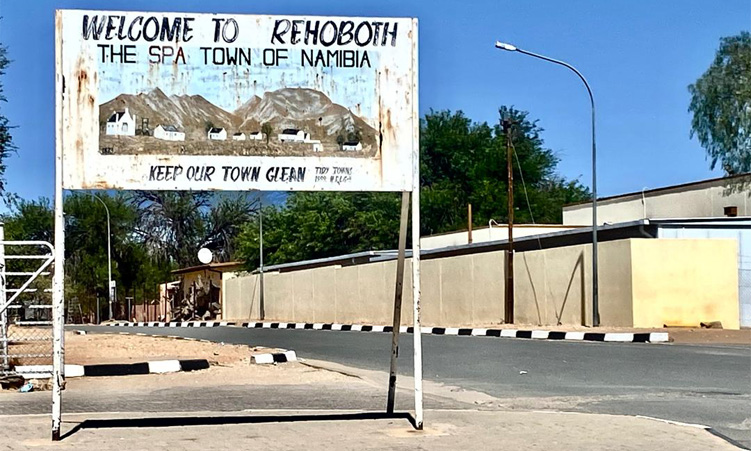IN the one corner: a capital city mayor claiming he has been the victim of a vicious act of character assassination posing as journalism.
In the other corner: a weekly tabloid newspaper claiming it was correct and justified when it linked the mayor to an alleged “underhanded land deal”. And in the middle sits the referee, High Court Judge Louis Muller.After hearing arguments from lawyers representing Windhoek Mayor Matheus Shikongo and the owner of the weekly tabloid Informanté, its editor, Max Hamata, and its printing company, Free Press Printers, in the High Court in Windhoek on Monday, Judge Muller has reserved judgement in Shikongo’s defamation case against Trustco Group International, Hamata and Free Press Printers.The source of Shikongo’s ire and the libel claim of $500 000 that he filed in late 2006 is a front-page story that was published in Informanté on September 21 2006.’Fincky aids Broederbond’s land cause’, the story’s headline stated.The article was about a transaction in which the Wanderers Sports Club in Windhoek sold a piece of land that it had bought at a nominal price of one cent a square metre from the City of Windhoek in 1973 to a property developer, allegedly without the Windhoek City Council having been made aware that the City had a right to exercise a first option to buy the land if it was to be sold by Wanderers.With a reference to a “Broederbond cartel” that had supposedly “made a killing” from land bought from the City of Windhoek at a price of one cent a square metre, the Afrikaner Broederbond – a secretive Afrikaner organisation that provided the impetus and backbone for the creation and maintenance of apartheid in South Africa from 1948 – was also dragged into the story.Not mentioned however was that the initial land sale had taken place as far back as 1973.Nor was comment from Shikongo included in the story.Shikongo is claiming that Hamata, who wrote the story, and the newspaper defamed him by stating things like that he was “connected to a Broederbond cartel” and had been involved in “an irregular land deal”.According to Shikongo the story was understood to mean that he was dishonest, abused his position as mayor of Windhoek, that he neglected his duties to the public, and that he abused his supposed position as a board member of Bank Windhoek, which financed the development of the sold land, whereas Shikongo was in fact not a member of the bank’s board but of that of the bank’s holding company.Shikongo initially sued Trustco, Hamata and the printers for N$300 000.However, after the start of the trial on his libel claim, where Hamata and Trustco boss Quinton van Rooyen dug in their heels and insisted on the essential correctness of the story, he increased his defamation claim to N$500 000.The leader of Shikongo’s team of lawyers, senior counsel Pieter Henning, told Judge Muller on Monday that the article “vilified (Shikongo) in the minds of readers”.Said Henning: “It degraded his status in the community.It seriously harmed his reputation.”Had that story been an attack on Shikongo’s physical person, it probably would have resulted in a charge of attempted murder being laid against Hamata and the newspaper, Henning said.”This article constituted character assassination,” he argued.”The tone of the article was vicious.It was vicious, it was nasty.”The story was an example of a knife not only being used to pierce someone’s body, but then also being twisted non-stop, Henning said.Namibia’s Constitution states that the dignity of all persons shall be inviolable, Henning said.The article in question had been a serious violation of Shikongo’s dignity, he argued.The article was not only factually incorrect, but even if its contents were partially true, the publication of such defamatory matter could never be in the public interest, Henning argued.Raymond Heathcote, representing Trustco, Hamata and the printing company, told Judge Muller that it was stated nowhere in the article that Shikongo had abused his position as mayor of Windhoek, or that he had abused his position as a Bank Windhoek board member, or that he had been dishonest.Neither did the story state that he had been part of an underhanded land deal or had received money as part of this, Heathcote added.Anyone knowing who Shikongo is would also know that he could not be a member of something like the Broederbond, he said further.What the article did state, Heathcote conceded, was that Shikongo had allowed the deal to go through.To then state that Shikongo had neglected his duties to the voters of Windhoek is not defamatory, Heathcote said.”To say of a politician that he is neglecting his duties to the voters is something that you will hear every day from the political rostrums of this country,” he stated.It had been proven that the deal through which Wanderers sold the land it had bought from the City some 30 years earlier was indeed an underhanded deal, Heathcote said, because the City was not initially made aware of this transaction to enable it to exercise its right to have a first option to buy the land at the same price it had sold it for, plus compensation for improvements on the land.He argued that it had not been proven that Shikongo had been defamed as claimed.Shikongo’s case against Informanté is the first of several pending defamation claims against the newspaper to have gone on trial, and as such it presents a test of sorts for the tabloid publication.Heathcote acted on instructions from Mark Kutzner of the law firm Engling, Stritter and Partners.Henning and co-counsel Esi Schimming-Chase represented Shikongo on instructions from At Slabber of the firm Dr Weder, Kauta, Hoveka Inc.And in the middle sits the referee, High Court Judge Louis Muller.After hearing arguments from lawyers representing Windhoek Mayor Matheus Shikongo and the owner of the weekly tabloid Informanté, its editor, Max Hamata, and its printing company, Free Press Printers, in the High Court in Windhoek on Monday, Judge Muller has reserved judgement in Shikongo’s defamation case against Trustco Group International, Hamata and Free Press Printers.The source of Shikongo’s ire and the libel claim of $500 000 that he filed in late 2006 is a front-page story that was published in Informanté on September 21 2006.’Fincky aids Broederbond’s land cause’, the story’s headline stated.The article was about a transaction in which the Wanderers Sports Club in Windhoek sold a piece of land that it had bought at a nominal price of one cent a square metre from the City of Windhoek in 1973 to a property developer, allegedly without the Windhoek City Council having been made aware that the City had a right to exercise a first option to buy the land if it was to be sold by Wanderers.With a reference to a “Broederbond cartel” that had supposedly “made a killing” from land bought from the City of Windhoek at a price of one cent a square metre, the Afrikaner Broederbond – a secretive Afrikaner organisation that provided the impetus and backbone for the creation and maintenance of apartheid in South Africa from 1948 – was also dragged into the story.Not mentioned however was that the initial land sale had taken place as far back as 1973.Nor was comment from Shikongo included in the story.Shikongo is claiming that Hamata, who wrote the story, and the newspaper defamed him by stating things like that he was “connected to a Broederbond cartel” and had been involved in “an irregular land deal”.According to Shikongo the story was understood to mean that he was dishonest, abused his position as mayor of Windhoek, that he neglected his duties to the public, and that he abused his supposed position as a board member of Bank Windhoek, which financed the development of the sold land, whereas Shikongo was in fact not a member of the bank’s board but of that of the bank’s holding company.Shikongo initially sued Trustco, Hamata and the printers for N$300 000.However, after the start of the trial on his libel claim, where Hamata and Trustco boss Quinton van Rooyen dug in their heels and insisted on the essential correctness of the story, he increased his defamation claim to N$500 000.The leader of Shikongo’s team of lawyers, senior counsel Pieter Henning, told Judge Muller on Monday that the article “vilified (Shikongo) in the minds of readers”.Said Henning: “It degraded his status in the community.It seriously harmed his reputation.”Had that story been an attack on Shikongo’s physical person, it probably would have resulted in a charge of attempted murder being laid against Hamata and the newspaper, Henning said.”This article constituted character assassination,” he argued.”The tone of the article was vicious.It was vicious, it was nasty.”The story was an example of a knife not only being used to pierce someone’s body, but then also being twisted non-stop, Henning said.Namibia’s Constitution states that the dignity of all persons shall be inviolable, Henning said.The article in question had been a serious violation of Shikongo’s dignity, he argued.The article was not only factually incorrect, but even if its contents were partially true, the publication of such defamatory matter could never be in the public interest, Henning argued.Raymond Heathcote, representing Trustco, Hamata and the printing company, told Judge Muller that it was stated nowhere in the article that Shikongo had abused his position as mayor of Windhoek, or that he had abused his position as a Bank Windhoek board member, or that he had been dishonest.Neither did the story state that he had been part of an underhanded land deal or had received money as part of this, Heathcote added.Anyone knowing who Shikongo is would also know that he could not be a member of something like the Broederbond, he said further.What the article did state, Heathcote conceded, was that Shikongo had allowed the deal to go through.To then state that Shikongo had neglected his duties to the voters of Windhoek is not defamatory, Heathcote said.”To say of a politician that he is neglecting his duties to the voters is something that you will hear every day from the political rostrums of this country,” he stated.It had been proven that the deal through which Wanderers sold the land it had bought from the City some 30 years earlier was indeed an underhanded deal, Heathcote said, because the City was not initially made aware of this transaction to enable it to exercise its right to have a first option to buy the land at the same price it had sold it for, plus compensation for improvements on the land.He argued that it had not been proven that Shikongo had been defamed as claimed.Shikongo’s case against Informanté is the first of several pending defamation claims against the newspaper to have gone on trial, and as such it presents a test of sorts for the tabloid publication.Heathcote acted on instructions from Mark Kutzner of the law firm Engling, Stritter and Partners.Henning and co-counsel Esi Schimming-Chase represented Shikongo on instructions from At Slabber of the firm Dr Weder, Kauta, Hoveka Inc.
Stay informed with The Namibian – your source for credible journalism. Get in-depth reporting and opinions for
only N$85 a month. Invest in journalism, invest in democracy –
Subscribe Now!






